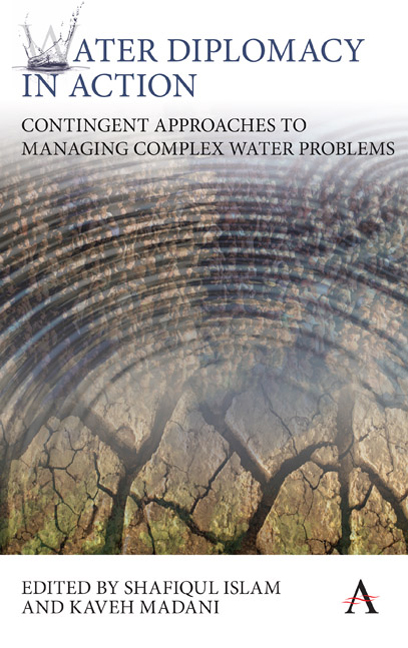Book contents
- Frontmatter
- Contents
- List of Figures
- List of Tables
- The Blind Men, the Elephant and the Well: A Parable for Complexity and Contingency
- Preface
- Part I ROOTS AND CAUSES OF COMPLEXITY AND CONTINGENCY IN WATER PROBLEMS
- Chapter One Complexity and Contingency: Understanding and Managing Complex Water Problems
- Chapter Two Leveraging Diplomacy for Resolving Transboundary Water Problems
- Part II TOOLS, TECHNIQUES, MODELS AND ANALYSES TO RESOLVE COMPLEX WATER PROBLEMS
- Part III CASE STUDIES
- Notes on Contributors
- Index
Chapter Two - Leveraging Diplomacy for Resolving Transboundary Water Problems
from Part I - ROOTS AND CAUSES OF COMPLEXITY AND CONTINGENCY IN WATER PROBLEMS
Published online by Cambridge University Press: 10 January 2018
- Frontmatter
- Contents
- List of Figures
- List of Tables
- The Blind Men, the Elephant and the Well: A Parable for Complexity and Contingency
- Preface
- Part I ROOTS AND CAUSES OF COMPLEXITY AND CONTINGENCY IN WATER PROBLEMS
- Chapter One Complexity and Contingency: Understanding and Managing Complex Water Problems
- Chapter Two Leveraging Diplomacy for Resolving Transboundary Water Problems
- Part II TOOLS, TECHNIQUES, MODELS AND ANALYSES TO RESOLVE COMPLEX WATER PROBLEMS
- Part III CASE STUDIES
- Notes on Contributors
- Index
Summary
Abstract
Water is a fundamental precondition for human life. Yet, much of it transcends state borders via shared river and lake basins or groundwater aquifers. The resulting political, economic, social and environmental interdependencies give water resources the crucial potential either to foster cooperation or exacerbate conflict. Transboundary waters thus constitute a promising entry point for diplomats aiming for high peace dividends, warranting strong interest from foreign policy makers. Yet there is a lack of agency at the international level. As a result, the international community faces huge challenges when it comes to systematically taking early action to both respond to emerging crises and reinforce cooperation. This chapter, therefore, argues that foreign policy makers can and should do more to realize these dividends by exerting political leadership in fostering intrabasin cooperation and integration, connecting and reinforcing appropriate institutional structures for coordinated and cross-sectoral comprehensive engagement and for strengthening the diplomatic track of transboundary cooperation on water. This chapter proposes a number of specific instruments of engagement. Yet, in the end, strengthening the governance of transboundary waters hinges on strengthening and connecting the institutions, national and international, that can channel political will into coherent action.
Introduction
The global water crisis is of such a magnitude that it is growing into an issue of common global concern.1 This perspective puts the focus on water systems shared by two or more countries. Transboundary waters constitute a pivotal but underappreciated issue in global politics. The territories of 148 nations fall within international river basins that include the political boundaries of two or more countries (UN Water 2016). These international river basins cover 46 percent of the Earth's land surface (UN Water 2016), host about 40 percent of the world's population and account for approximately 60 percent of global river flow (Wolf et al. 2003). Shared waters are, therefore, often of critical importance for riparian states, that is, the states that comprise part of a transboundary basin. As a consequence, the use and apportionment of water in these basins is both a source of conflict risks and a chance for institutionalizing cooperative behavior.
- Type
- Chapter
- Information
- Water Diplomacy in ActionContingent Approaches to Managing Complex Water Problems, pp. 19 - 34Publisher: Anthem PressPrint publication year: 2017

